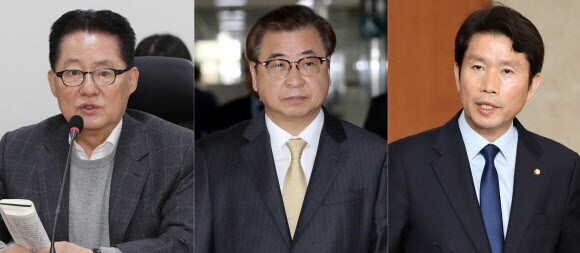hankyoreh
Links to other country sites 다른 나라 사이트 링크
[Editorial] Moon overhaul of foreign policy and national security personnel will hopefully lead to breakthrough in inter-Korean relations

South Korean President Moon Jae-in’s overhaul of his foreign policy and national security teams communicates his strong commitment to improving inter-Korean relations. On July 3, Moon unexpectedly nominated former lawmaker Park Jie-won, who played an instrumental role in organizing the first inter-Korean summit, as director of the National Intelligence Service (NIS). Moon also nominated Lee In-young, a lawmaker with the ruling Democratic Party, as Minister of Unification. Previous NIS Director Suh Hoon, who has shepherded North Korean policy since Moon’s inauguration, has been reassigned to direct the Blue House National Security Office. Suh is replacing Chung Eui-yong, who will serve as a special advisor for foreign policy and national security, along with Lim Jong-seok, Moon’s former chief of staff.
Park, Lee, Suh, and Lim are all figures with ample experience and commitment to inter-Korean relations. Considering that there have been calls for a reshuffle of the foreign policy and national security lineup since North Korea blew up the inter-Korean joint liaison office in Kaesong on June 16, we hope that this will be lead to a breakthrough in inter-Korean relations and restart the Korean Peninsula Peace Process. Park Jie-won in particular has long been a major player in inter-Korean relations: in 2000, he met with former North Korean leader Kim Jong-il as a special envoy from then South Korean President Kim Dae-jung and helped arrange the inter-Korean summit held on June 15 of that year. We hope that Park’s years of experience will help him restore inter-Korean dialogue as the NIS director
Suh Hoon is a veteran of North Korean affairs who has played a behind-the-scenes role during the inter-Korean summits held during the presidencies of Kim Dae-jung, Roh Moo-hyun, and Moon Jae-in. He has also communicated closely with American intelligence officers about Korean Peninsula affairs. But he bears some responsibility for the deterioration of inter-Korean relations over the past year or so, following the North Korea-US summit in Hanoi in February 2019, which ended without a deal. He needs to take stock of his shortcomings and build momentum in his new position as coordinator of foreign policy and national security.
As a four-term lawmaker with the Democratic Party, Lee In-young has political clout, including a stint as the party’s floor leader. That means he ought to help the Ministry of Unification regain its status as the responsible ministry for pushing forward inter-Korean relations. We hope that Lee will bear in mind that the Unification Ministry has faced considerable criticism for failing to play its proper role in promoting inter-Korean dialogue, exchange, and cooperation, not only in the past but also under the Moon administration.
Given the gravity of the situation on the Korean Peninsula, the officials on the new foreign policy and national security lineup have big shoes to fill. They need to unclog the channels of inter-Korean dialogue and do everything necessary, with boldness and creativity, to enable the North Korea-US denuclearization talks to resume before the US presidential election in November. It’s a big shame that the situation on the Korean Peninsula has deteriorated while Seoul hesitated to take measures to improve inter-Korean relations out of concern for what the US might think, simply standing by and waiting for North Korea-US relations to improve. The new foreign policy and national security team needs to engineer a breakthrough in inter-Korean relations through a daring change of thinking and to revive the sparks of inter-Korean dialogue and North Korea-US negotiations.
We also hope that North Korea will make a positive and forward-looking response to the proactive overture represented by the South Korean government’s shuffle of its foreign policy and national security team.
Please direct comments or questions to [english@hani.co.kr]

Editorial・opinion
![[Guest essay] Preventing Korean Peninsula from becoming front line of new cold war [Guest essay] Preventing Korean Peninsula from becoming front line of new cold war](https://flexible.img.hani.co.kr/flexible/normal/500/300/imgdb/original/2024/0507/7217150679227807.jpg) [Guest essay] Preventing Korean Peninsula from becoming front line of new cold war
[Guest essay] Preventing Korean Peninsula from becoming front line of new cold war![[Column] The state is back — but is it in business? [Column] The state is back — but is it in business?](https://flexible.img.hani.co.kr/flexible/normal/500/300/imgdb/original/2024/0506/8217149564092725.jpg) [Column] The state is back — but is it in business?
[Column] The state is back — but is it in business?- [Column] Life on our Trisolaris
- [Editorial] Penalties for airing allegations against Korea’s first lady endanger free press
- [Editorial] Yoon must halt procurement of SM-3 interceptor missiles
- [Guest essay] Maybe Korea’s rapid population decline is an opportunity, not a crisis
- [Column] Can Yoon steer diplomacy with Russia, China back on track?
- [Column] Season 2 of special prosecutor probe may be coming to Korea soon
- [Column] Park Geun-hye déjà vu in Yoon Suk-yeol
- [Editorial] New weight of N. Korea’s nuclear threats makes dialogue all the more urgent
Most viewed articles
- 1[Guest essay] Preventing Korean Peninsula from becoming front line of new cold war
- 2After 2 years in office, Yoon’s promises of fairness, common sense ring hollow
- 360% of young Koreans see no need to have kids after marriage
- 4Yoon’s broken-compass diplomacy is steering Korea into serving US, Japanese interests
- 5[Column] Why Korea’s hard right is fated to lose
- 6S. Korean first lady likely to face questioning by prosecutors over Dior handbag scandal
- 7Is Japan about to snatch control of Line messenger from Korea’s Naver?
- 8[News analysis] Jo Song-gil’s defection and its potential impact on inter-Korean relations
- 911 years after US decamped, military base in Busan still festering with pollution
- 10[Editorial] The ideals of the Korean Provisional Government are still threatened today